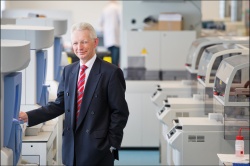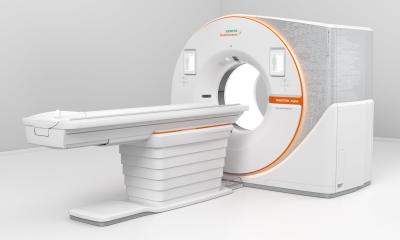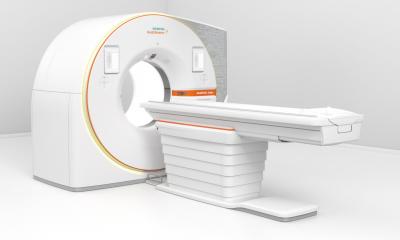Automation
Scottish NHS group endorses automation
It’s thumbs up for Siemens Healthcare Diagnostics’ Aptio Automation, following a two-year deployment by Dundee-based National Health Service (NHS) Dundee, the first north European healthcare organisation to use the system to consolidate formerly siloed biochemistry, immunology, haematology and haemostasis testing onto a single automation track.


Tayside now processes 7,000 tubes per day – a 20% increase in its main laboratory workload, with no additional staff. Total decreased turnaround time (TAT) brought a 61% improvement in TAT for add-on tests – all with high-quality results.
Three labs into one
Serving 480,000 people through 22 hospitals/infirmaries and 69 general-practices, Tayside relies on two laboratories. In the Blood Sciences Laboratory at the 900-bed Ninewells teaching hospital, Aptio Automation merged three former individual labs onto a single track, fully providing pre- and post-analytical sample-processing modules along with comprehensive analytics.
By crossing traditional disciplinary boundaries and standardising and streamlining flow of information, samples and data back to patients, Dr Bill Bartlett, NHS Tayside Joint Clinical Director of Diagnostics, concludes, lab services are transformed from cost centre to value investment.
‘The new system can track and manage 3,600 specimens an hour just in circulation. At the touch of a CentraLink system screen, we can also retrieve and drive testing on up to 15,000 more samples stored in the Aptio refrigeration module.’
Thus Ninewells lab could take on 73% of testing formerly conducted at the 260-bed Perth Royal Infirmary (PRI), enabling that smaller laboratory to focus on acute admissions and in-patient testing. Ninewells now handles 100% of the general-practice testing in the entire region.
Results
The Ninewells Blood Sciences Laboratory processes up to 7,000 tubes a day on the Aptio Automation track, 1,700 tubes an hour at peak times. Despite volume increases of around 5% per year since 2012, samples no longer back up. Median TAT is 41 minutes, with 95% of the work completed in 67 minutes. ‘Our input potential has increased 246%, without the additional capacity of the Input Output Module, which is reserved for STAT samples and used heavily for sorting,’ Bartlett points out.
The 75-foot track employs a variety of modules to reduce manual samples handling, ease test re-runs and add-on testing, and speed all TAT, all enabling Tayside to up-level biomedical and clinical scientists responsibilities.
Customising workflow management
The CentraLink Data Management System drives Aptio Automation. With end-to-end touch points, the CentraLink system consolidates information from the LIS, track, and instruments to automate workflows in a lean, multidisciplinary laboratory that can handle routine and emergency testing on one track. The CentraLink system customises and standardises workflows across automation, analysers and IT. Additionally, when add-on orders arrive, the CentraLink system finds the tube on the track or in refrigerated storage, coordinates de-capping and/or aliquoting, sends it to the right analyser and uploads results. Shirley McKay, associate services manager at the Ninewells lab: ‘We can drill down and look at each individual sample, the route it takes, and re-route as needed.’
The lab can also use auto-verification for approximately 90% of its workload, she adds; such high volumes could not be processed if validating everything manually. Logic rules in the CentraLink system can be test- and site-dependent, for example, so that renal ward rules can differ from those of the paediatric ward.
Bartlett recalls that, after a 90-minute fire drill, staff returned to find the Aptio Automation Rack Input Module and track empty, with specimens processed and in their storage units, and the CentraLink system validating the data.
New tests reduce costs
‘We received the first new immunoassay funding in five years by demonstrating how to generate 38 antibiotic-free days per month in the ICU by introducing procalcitonin testing at the starting or stopping of antibiotics,’ Bartlett adds. Although no big drug saving, cutting one night’s ICU stay saves around £1,200.
The CentraLink system’s ability to take data from systems on the multidisciplinary Aptio Automation track enables secondary, cascade testing. Tayside’s clinical and lab teams are collaborating to develop simple user interfaces – powered by complex algorithms – to enable liver disease investigation. Far from automation reducing staff, Bartlett points, out, knowledge and skills are re-directed to augment care.
Expert guidance
Bartlett says the project’s success is down to Siemens’ expertise and consultative approach. ‘We relied on them to evaluate workloads recommend the optimal mix of instruments to support peak loads. They not only saw what happens in this lab, they have a lot of experience in labs elsewhere and understand the environment.’
Members of the Siemens team chaired meetings with biologists and biochemists and its consultants helped people formerly working in silos to understand how their actions affected downstream workflows for others, and vice versa. It also gave support in the transition period to the new track, said McKay: ‘On occasion, they even helped with sample processing!’
Two years later the consultants still support Tayside with services and strategic consulting for process engineering.
24.04.2015
- automation (208)
- company (213)
- data management (587)
- diagnostics (569)
- laboratory (1111)
- management (224)
- workflow (495)
- work space (60)





